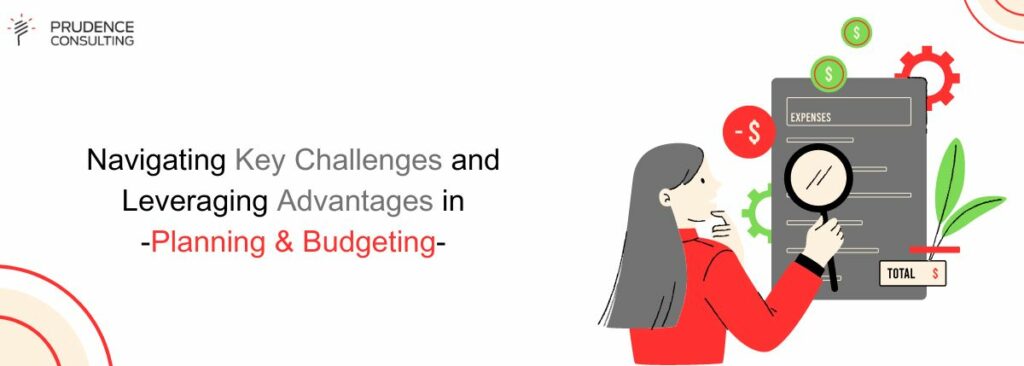Navigating Key Challenges and Leveraging Advantages in Planning and Budgeting
-
June 14, 2023
- Posted by: piyush.gupta@prudencesoftech.in
- Category: ERP
No Comments
- June 14, 2023
- Posted by: piyush.gupta@prudencesoftech.in
- Category: ERP
Planning and budgeting are integral components of successful financial management for businesses. They provide a structured approach to setting goals, allocating resources, and making informed decisions.

However, navigating the challenges associated with planning and budgeting is essential to effectively leverage their advantages. In this blog, we will explore the key challenges that organizations face in the planning and budgeting process and discuss strategies to overcome them.
Top 3 Key Challenges in Planning and Budgeting
#Uncertainty
The dynamic business environment presents challenges in predicting future market conditions, customer demands, and economic factors. Uncertainty and volatility can make it difficult to accurately forecast revenues, expenses, and cash flows, undermining the effectiveness of planning and budgeting efforts.
#Lack of Data Accuracy and Timeliness
Incomplete or inaccurate data can hinder the accuracy of forecasts and budgetary projections. The availability and reliability of data sources, as well as the timeliness of data collection and analysis, pose challenges in making informed decisions and formulating realistic budgets.
#Complex Organizational Structures
Large organizations with multiple departments and business units face challenges in aligning planning and budgeting across different functions. Coordinating inputs from various stakeholders, ensuring consistency, and overcoming soloed decision-making can be daunting tasks.
Top 3 Advantages of Planning and Budgeting
#Goal Alignment and Strategic Focus
Planning and budgeting provide an opportunity for organizations to align their goals and objectives with their overall strategic vision. By setting clear targets and priorities, businesses can ensure that resources are allocated efficiently, driving the organization towards its desired outcomes.
#Resource Optimization
Effective planning and budgeting help organizations optimize their resources by identifying areas of inefficiency and allocating resources strategically. This allows for better cost management, improved resource allocation, and the identification of opportunities for growth and investment.
#Performance Monitoring and Control
Planning and budgeting provide a framework for monitoring and controlling performance against set targets. Regular tracking of key performance indicators (KPIs) allows organizations to identify deviations and take corrective actions in a timely manner, ensuring that goals are met and performance is optimized.
Also Read : Upgrade to dynamics 365 Business Central
Conclusion
Planning and budgeting are essential components of effective financial management, enabling businesses to navigate challenges, seize opportunities, and achieve their strategic objectives.
By recognizing and addressing key challenges such as uncertainty, data accuracy, complex structures, and resistance to change, organizations can harness the advantages of planning and budgeting. These advantages include goal alignment, resource optimization, performance monitoring, and risk management.
By leveraging these benefits, businesses can enhance their financial decision-making, drive growth, and position themselves for long-term success.


